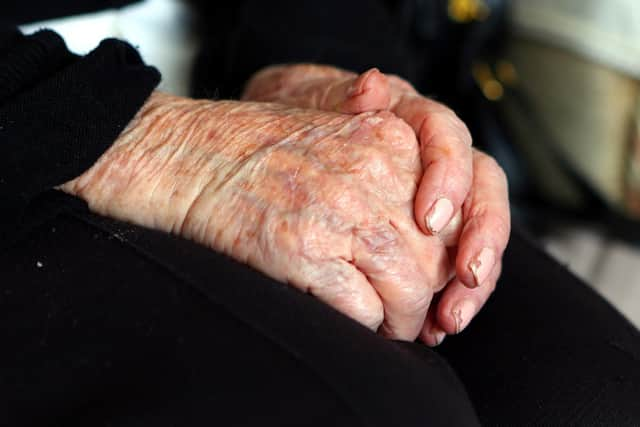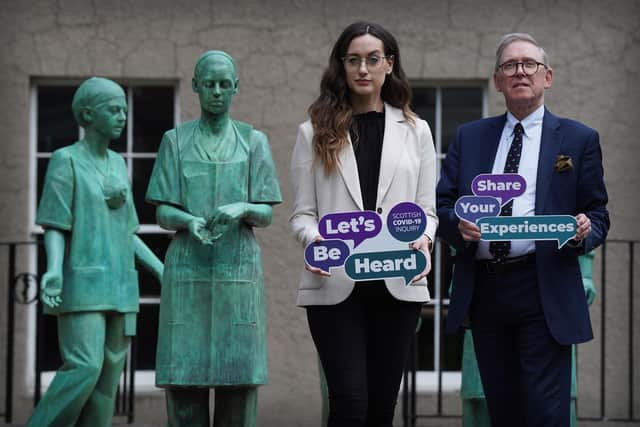Scottish Covid inquiry: Union leaders and care home bosses clash over Scottish pandemic response
A row has broken out between union leaders and care home bosses, after organisers said private care homes put staff and residents at risk during the pandemic “because many refused to work with trade unions” – something care home bosses say “flies in the face of reality”.
Paul Arkison, a senior organiser with GMB Scotland, is set to tell the Scottish Covid-19 Inquiry in Edinburgh on Tuesday that staff were pressured to work despite displaying symptoms of Covid, creating “a huge amount of mistrust and anger towards these employers”.
Advertisement
Hide AdAdvertisement
Hide AdMr Arkison’s statement to the inquiry, given to The Scotsman, reads: “We found it difficult dealing with the private care sector, possibly because of the relationship we had with those employers before lockdown. As we entered the pandemic, we needed real assistance and input from these companies, which, in my opinion, was not there.


“These companies needed to be challenged all the way.”
On personal protective equipment (PPE), Mr Arkison said there was “a lack of engagement from some care providers” regarding its use. He claimed some private care homes were being “very resistant to having any formal recognition agreements with unions where things like this could be discussed”.
“We were questioning private care companies about not having the correct safety equipment and they would simply reply that it was correct,” Mr Arkison’s statement reads. “There would be no dialogue and no attempt to understand the concerns of staff.”
Mr Arkison said he believed workers had to use poor-quality PPE. “Essentially, we felt that our members, overwhelmingly low paid, working-class women were being provided with the cheapest possible masks or really low-quality plastic gowns,” he said.


Mr Arkison also highlighted the delayed testing of care staff as another “huge concern” along with the transfer of untested patients from hospital to homes.
GMB Scotland says it wrote to the then-health minister Jeane Freeman in April 2020, calling for testing of all workers in private homes. However, routine testing did not begin for another five months.
Mr Arkison said this caused “confusion and mistrust of ministers that still lingers today”.
“Post pandemic very little has changed,” he said. “Some private care companies are still looking to disengage with unions and we need all organisations to commit to the best care for residents of care homes and the best conditions for those delivering that care.
Advertisement
Hide AdAdvertisement
Hide Ad“Private care companies need to show they are committed to moving away from the minimum levels of pay and conditions currently in place. Lessons must be learned and there must be a better recognition of the value of the work done by people in the private care sector. What they went through during the pandemic has still not been properly recognised.”
When GMB Scotland’s statement was put to Scottish Care, the organisation said it “does not recognise the description of private care homes expressed” by the union.
“It flies in the face of the reality,” a Scottish Care spokesperson said. “Throughout the pandemic, Scottish Care staff and members worked closely with many trade unionists to ensure that all staff were kept both safe and well.
“Due to the nature of release by Public Health Scotland and Scottish Government, there were times when there was confusion as to what PPE should be worn in specific circumstances as the GMB evidence acknowledges. This uncertainty resulted in a few instances where the contribution of some local union officials was unhelpful in requesting a level of PPE be worn by staff in care homes which was not what guidance was saying was needed at the time.
“Whilst this was usually worked out at local level, the additional burden put on staff at this time by union officials cannot be ignored.”
However, Scottish Care said it shared the concern of GMB Scotland in relation to the “disproportionate prioritising of the NHS and on-staff testing”, which it has highlighted to the inquiry itself.
“Whilst it is still a minority of care staff who choose to join a trade union, this is not the only way of achieving effective voice,” the Scottish Care spokesperson said. “It was and is true to say that employers sought to work positively with local officials even in situations which were stressful and challenging.
“In unknown circumstances, everyone was under a lot of pressure throughout the pandemic and we saw a dedicated professionalism of staff putting themselves at risk by being present even when we knew little about the virus.”
Advertisement
Hide AdAdvertisement
Hide AdScottish Care said there was “a growing and developing positive relationship between care providers”, both private and not for profit, “and so we find it especially regrettable that some of the comments by the GMB put that partnership working at risk”.
“Scottish Care and all our members have worked ceaselessly since the pandemic to improve terms and conditions of workers not least in what is contracted by local authorities,” the spokesperson said. “We do not consider that current rates of pay are adequate and have worked with many trade unions to highlight our shared aspirations.
“We are all working for a situation where all staff are treated with equality regardless of the public or private organisation that employs them.”
The independent inquiry, which is funded by the Scottish Government, has already fancied considerable delays. In December 2021, then deputy first minister John Swinney announced Lady Poole would chair the inquiry. The official set up date for the inquiry was February 28, 2022
However, Lady Poole resigned the following October, citing personal reasons.
Lord Brailsford was then appointed chair, and the inquiry's terms of reference were published, after being amended to make explicit reference to a human rights-based approach.
The total cost of the Scottish Covid-19 Inquiry is already more than £8 million.
Comments
Want to join the conversation? Please or to comment on this article.